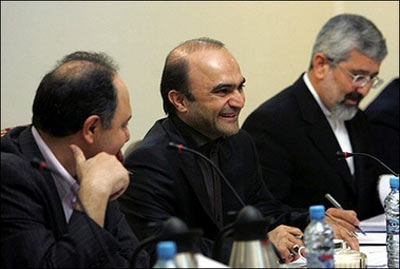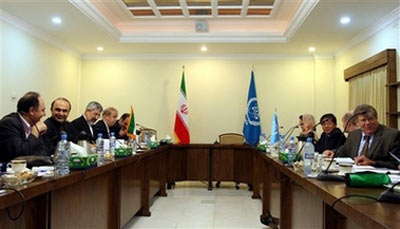A senior Iranian official said on Thursday that delegates from both Iran and the International Atomic Energy Agency (IAEA) were satisfied with the results of their new round of talks on Tehran's nuclear program, state broadcasting reported.
"The Iranian delegation and the IAEA delegation expressed satisfaction on the trend of talks on the issues of P-1 and P-2 (centrifuges)," deputy head of Iran's Supreme National Security Council Javad Vaeedi was quoted as saying.
Deputy head of Iran's Supreme National Security Council Javad Vaeedi (C) meets with Olli Heinonen, deputy director general of the IAEA in Tehran, October 29, 2007. (Xinhua/AFP Photo)
His remarks came after Iran and the UN nuclear watchdog ended here a new round of negotiations aimed at clearing up suspicions about Tehran's atomic activities.
"The head of the IAEA delegation (Olli Heinonen) and other experts brought up all their ambiguities and questions during the talks," said Vaeedi, who was also the head of the Iranian delegation.
Iranian top Iranian nuclear negotiator, Javad Vaeedi (2nd left) attends in a meeting with deputy Director General of the International Atomic Energy Agency (IAEA) Olli Heinonen, right, in Tehran, Iran, on Monday October 29, 2007. (Xinhua/Reuters Photo)
"The Iranian side gave all the necessary answers to address their questions," Vaeedi said.
However, Heinonen, deputy director general of the IAEA, was not quoted as making any comments after the talks, according to the report.
Top officials from the UN nuclear watchdog arrived in Tehran on Monday for the latest round of nuclear talks over Iran's P-1 and P-2 centrifuges.
Olli Heinonen, deputy director of the U.N. International Atomic Energy Agency (IAEA), speaks with Javad Vaeedi (L), Iran's deputy nuclear negotiator in Tehran October 29, 2007. (Xinhua/Reuters Photo)
"We have done many things so far but there remains a lot of other work that hopefully will be resolved," Heinonen was quoted by Iran's state media as saying upon his arrival at the airport on Monday.
The talks were crucial since the result of them could be basis for a report over the status of the Iranian uranium enrichment program by the IAEA chief Mohamed ElBaradei by the end of November.
The United States and some other Western countries fear Iran may try to develop atomic bombs under a civilian cover, however Tehran insists its nuclear program is for peaceful purposes only.
The UN Security Council has already issued two sanction resolutions against Iran's nuclear program since last December, but both of them failed to persuade the Islamic Republic to give up uranium enrichment work.
Washington now is trying to push the UN Security Council to adopt a third resolution against Tehran's defiance, but Iran's cooperation with the IAEA and the EU in the past months has let other world powers agree to wait ElBaradei's report until November to make their decision.
(Xinhua News Agency November 2, 2007)




